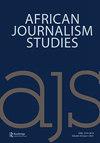关于津巴布韦青年政治机构的调解辩论
IF 1.8
3区 文学
Q3 COMMUNICATION
引用次数: 1
摘要
青年的政治能动性一直是政治学、青年研究、冲突研究和发展研究领域中许多理论争论的主题。本文采用媒体研究的观点,对津巴布韦青年的政治机构的争论。这样做的动机源于人们认识到现代政治主要是一种大众媒介政治。与此相关的是,津巴布韦媒体对青年与政治的主题进行了广泛的报道。使用批判政治经济学方法和定性框架分析,本文探讨了两个有目的的抽样案例研究,说明了关于津巴布韦青年政治机构的争论。研究结果表明,媒体对青年机构的塑造回避了那些激励和激励青年政治家的实质性政策和公共利益问题。这种规范缺陷的框架可归因于津巴布韦政治话语特征的政治平行和媒体两极分化。本文章由计算机程序翻译,如有差异,请以英文原文为准。
Mediated Contestations About the Political Agency of Youth in Zimbabwe
ABSTRACT The political agency of youth has been the subject of much theoretical debate within the domains of political science, youth studies, conflict studies and development studies. This paper adopts a media studies perspective to contestations about the political agency of Zimbabwean youth. Motivation for doing so derives from the recognition that modern politics is predominantly a mass-mediated politics. Relatedly, the subject of youth and politics has received extensive media coverage in Zimbabwean media. Using the critical political economy approach and qualitative frame analysis, the paper explores two purposively sampled case studies that illustrate the contestations about the political agency of Zimbabwean youth. Findings reveal that media framings of youth agency sidestep the substantive policy and public interest issues that animate and motivate young politicians. Such normatively deficient framing is attributable to the political parallelism and media polarisation that characterises Zimbabwean political discourse.
求助全文
通过发布文献求助,成功后即可免费获取论文全文。
去求助
来源期刊

African Journalism Studies
COMMUNICATION-
CiteScore
1.90
自引率
10.00%
发文量
18
期刊介绍:
Accredited by the South African Department of Higher Education and Training for university research purposes African Journalism Studies subscribes to the Code of Best Practice for Peer Reviewed Scholarly Journals of the Academy of Science of South Africa. African Journalism Studies ( AJS) aims to contribute to the ongoing extension of the theories, methodologies and empirical data to under-researched areas of knowledge production, through its emphasis on African journalism studies within a broader, comparative perspective of the Global South. AJS strives for theoretical diversity and methodological inclusivity, by developing theoretical approaches and making critical interventions in global scholarly debates. The journal''s comparative and interdisciplinary approach is informed by the related fields of cultural and media studies, communication studies, African studies, politics, and sociology. The field of journalism studies is understood broadly, as including the practices, norms, value systems, frameworks of representation, audiences, platforms, industries, theories and power relations that relate to the production, consumption and study of journalism. A wide definition of journalism is used, which extends beyond news and current affairs to include digital and social media, documentary film and narrative non-fiction.
 求助内容:
求助内容: 应助结果提醒方式:
应助结果提醒方式:


